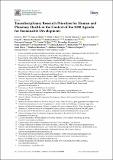Transdisciplinary Research Priorities for Human and Planetary Health in the Context of the 2030 Agenda for Sustainable Development

View/
Publication Date
2020Author
Kristie L. Ebi 1, * , Frances Harris 2 , Giles B. Sioen 3,4 , Chadia Wannous 5 , Assaf Anyamba 6 , Peng Bi 7 , Melanie Boeckmann 8 , Kathryn Bowen 9,10,11, Guéladio Cissé 12,13 , Purnamita Dasgupta 14 , Gabriel O. Dida 15,16 , Alexandros Gasparatos 17 , Franz Gatzweiler 18, Firouzeh Javadi 19 , Sakiko Kanbara 20, Brama Kone 21,22, Bruce Maycock 23 , Andy Morse 24, Takahiro Murakami 19, Adetoun Mustapha 25, Montira Pongsiri 26 , Gerardo Suzán 27, Chiho Watanabe 4 and Anthony Capon 2
Metadata
Show full item recordAbstract/
: Human health and wellbeing and the health of the biosphere are inextricably linked.
The state of Earth’s life-support systems, including freshwater, oceans, land, biodiversity, atmosphere,
and climate, affect human health. At the same time, human activities are adversely affecting natural
systems. This review paper is the outcome of an interdisciplinary workshop under the auspices of
the Future Earth Health Knowledge Action Network (Health KAN). It outlines a research agenda
to address cross-cutting knowledge gaps to further understanding and management of the health
risks of these global environmental changes through an expert consultation and review process.
The research agenda has four main themes: (1) risk identification and management (including related
to water, hygiene, sanitation, and waste management); food production and consumption; oceans;
and extreme weather events and climate change. (2) Strengthening climate-resilient health systems;
(3) Monitoring, surveillance, and evaluation; and (4) risk communication. Research approaches need to
be transdisciplinary, multi-scalar, inclusive, equitable, and broadly communicated. Promoting resilient
and sustainable development are critical for achieving human and planetary health.
